Introduction: Connecting the Gut and Brain Through Mushrooms
The relationship between the human gut and brain is a profound and complex connection often referred to as the gut-brain axis. Recent advances in nutritional neuroscience have brought forward compelling evidence that the health of our gut profoundly influences cognitive function, mood, and overall brain vitality. Amidst the myriad of natural interventions under study, mushroom supplements for gut health are rapidly gaining scientific and popular traction. These natural fungi, long prized in traditional medicine, are emerging as powerful allies in promoting digestive balance while enhancing cognitive performance.
Mushrooms are rich in bioactive compounds, prebiotic fibers, antioxidants, and adaptogens that interact beneficially with the gut microbiota. A healthy gut not only facilitates efficient digestion but also produces neurotransmitters like serotonin and dopamine, which regulate mood, focus, and mental clarity. As we delve deeper into the science behind mushrooms and their gut-supportive properties, it becomes clear that these natural wonders may be key in optimizing cognitive resilience through digestive well-being. This article explores the fascinating science and practical applications of mushroom supplements for gut health, shedding light on their role in addressing digestive issues, enhancing brain function, and supporting overall wellness.
You may also like: The Ultimate Guide to the Best Nootropic Mushrooms for Memory and Cognitive Enhancement
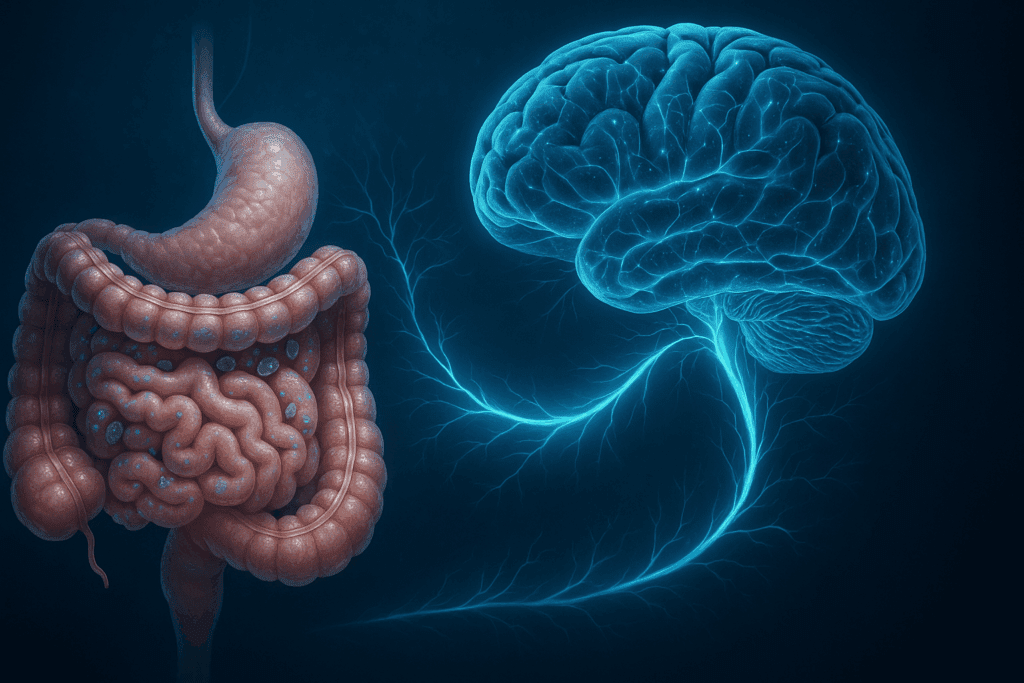
Understanding the Gut-Brain Axis and Why It Matters
The gut-brain axis is a bidirectional communication system linking the gastrointestinal tract and the central nervous system. This axis involves complex signaling pathways that include neural, hormonal, and immune mechanisms. One of the most crucial aspects of this communication network is the role of gut microbiota, the trillions of microorganisms residing in the digestive tract. These microbes play a vital role in regulating mood, stress response, and cognitive function by influencing the production of neurotransmitters, inflammatory responses, and even the permeability of the gut lining.
Studies have demonstrated that dysbiosis, or an imbalance in gut bacteria, can lead to neuroinflammation, cognitive decline, and mood disorders such as anxiety and depression. Conversely, a diverse and balanced microbiome supports optimal mental health and brain function. Therefore, maintaining gut health is not merely a digestive concern—it is foundational to overall mental wellness. Dietary interventions, particularly those involving functional foods like mushrooms, offer a promising avenue for modulating the gut microbiome and thereby enhancing brain health.
It is also noteworthy that the vagus nerve, a primary component of the parasympathetic nervous system, serves as a direct communication highway between the gut and the brain. This nerve transmits information about the state of the internal organs to the brain, and its activity is influenced by gut microbial metabolites. Mushroom-derived compounds such as beta-glucans and polyphenols have been shown to stimulate beneficial microbial activity and, by extension, support vagus nerve signaling. This contributes to improved mood regulation, focus, and cognitive clarity.
Understanding the gut-brain axis underscores the importance of gut health as a pillar of cognitive function. The integration of mushroom supplements into a wellness routine represents an exciting and evidence-based strategy to support this axis, particularly in the realms of neuroplasticity, memory, and emotional balance.
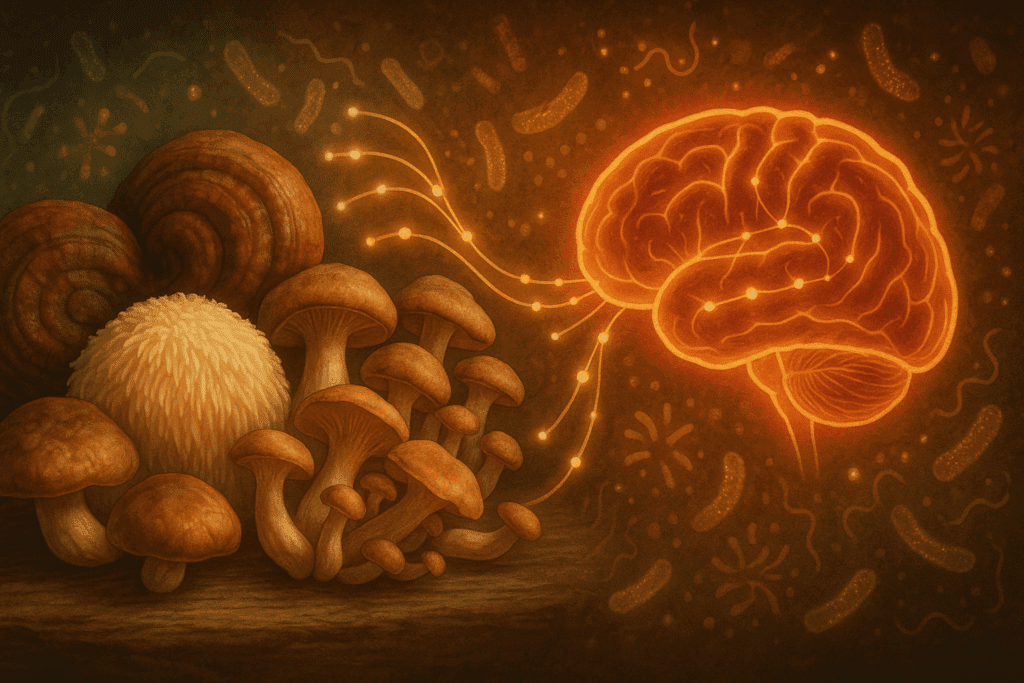
How Mushroom Supplements for Gut Health Support Cognitive Function
Mushroom supplements for gut health offer a multifaceted approach to enhancing cognition through their influence on the digestive system. These supplements typically contain extracts from medicinal mushrooms such as lion’s mane, reishi, cordyceps, chaga, and turkey tail. Each of these mushrooms offers unique bioactive compounds that act synergistically to support gut microbiota diversity and reduce gastrointestinal inflammation.
Lion’s mane mushroom (Hericium erinaceus), for example, is celebrated for its neuroregenerative properties. It stimulates the production of nerve growth factor (NGF), a protein essential for the survival and maintenance of neurons. At the same time, lion’s mane supports gut health by acting as a prebiotic and modulating gut bacterial populations. This dual action makes it an ideal candidate for enhancing memory, concentration, and emotional resilience while promoting digestive balance.
Reishi mushroom (Ganoderma lucidum) is another prominent player in the gut-brain narrative. Known for its adaptogenic and immunomodulatory properties, reishi supports the integrity of the intestinal barrier and reduces systemic inflammation. By lowering the inflammatory load on the body, it indirectly enhances cognitive processes such as mental clarity and stress management. Similarly, turkey tail mushroom is rich in polysaccharopeptides, compounds that have been shown to enhance gut microbial diversity and resilience. These improvements in gut ecology translate to better neurotransmitter balance and reduced risk of cognitive decline.
Moreover, mushroom supplements for gut health often include fermented extracts that further enhance bioavailability and effectiveness. Fermentation increases the concentration of beneficial metabolites and makes the nutrients more accessible to both the gut lining and the resident microbiota. This process amplifies the cognitive benefits by ensuring that the brain receives the essential nutrients and signals it needs to function optimally.
Incorporating mushroom supplements into a daily routine thus serves as a comprehensive strategy to support both digestion and cognition. Their impact on the gut microbiome, inflammation, and neurotransmitter synthesis establishes them as powerful tools in the pursuit of holistic mental wellness.
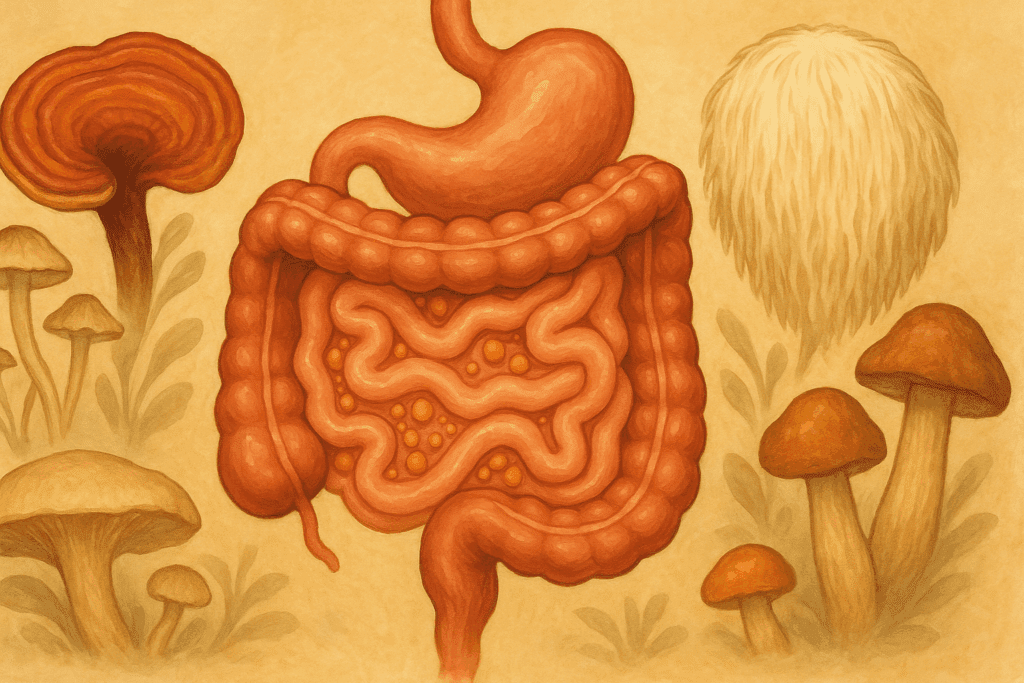
Are Mushrooms Good for Digestion and Gut Health?
A foundational question that many health-conscious individuals ask is: are mushrooms good for digestion? The answer, supported by emerging research, is a resounding yes. Mushrooms, particularly medicinal varieties, contain high levels of prebiotic fibers such as beta-glucans and chitin. These fibers resist digestion in the upper gastrointestinal tract and reach the colon intact, where they serve as nourishment for beneficial bacteria.
By feeding commensal microbes like Bifidobacteria and Lactobacillus, mushrooms promote a balanced and diverse microbiome. This microbial diversity is essential for producing short-chain fatty acids (SCFAs) like butyrate, propionate, and acetate, which have anti-inflammatory properties and help maintain the integrity of the gut lining. SCFAs also influence the production of serotonin, the “feel-good” neurotransmitter, which is predominantly synthesized in the gut.
Mushrooms are also low in fat and contain anti-inflammatory compounds that soothe the gastrointestinal lining. Reishi and chaga, in particular, have been shown to reduce gut inflammation and improve symptoms of irritable bowel syndrome (IBS) and inflammatory bowel disease (IBD). Additionally, their immune-modulating effects help maintain a healthy balance between microbial tolerance and immune response, reducing the likelihood of gut-related autoimmune reactions.
The adaptogenic nature of mushrooms further contributes to digestive health by modulating stress, which is a major contributor to gastrointestinal dysfunction. Chronic stress can impair gut motility, increase intestinal permeability, and disrupt microbial balance. By supporting the adrenal glands and reducing cortisol levels, mushrooms like cordyceps and reishi help restore digestive harmony.
Given these diverse benefits, it becomes clear why the question “are mushrooms good for gut health?” consistently yields affirmative responses. From microbial support to inflammation modulation and stress reduction, mushrooms offer a holistic approach to digestive wellness that in turn supports cognitive function.

The Best Mushroom Supplements for Gut Health and Bloating Relief
When seeking effective interventions for digestive discomfort and bloating, many individuals turn to natural remedies. Among these, mushroom supplements for gut health have gained popularity for their capacity to alleviate gastrointestinal symptoms while enhancing overall wellbeing. Several specific mushroom species stand out for their effectiveness in reducing bloating and supporting gut health.
Turkey tail mushroom is widely recognized as one of the best mushroom supplements for bloating due to its rich content of polysaccharopeptides (PSP) and polysaccharide-K (PSK). These compounds act as immunomodulators and prebiotics, promoting a diverse and resilient microbiome. This microbial balance helps reduce fermentation-related gas production and improves nutrient absorption, key factors in managing bloating.
Lion’s mane also proves effective in supporting digestion and relieving bloating. By modulating the enteric nervous system and reducing gut inflammation, lion’s mane improves gastric motility and reduces the buildup of intestinal gas. Its dual impact on the nervous and digestive systems makes it a valuable supplement for those experiencing stress-induced bloating or irritable bowel symptoms.
For individuals struggling with food sensitivities or post-antibiotic dysbiosis, reishi and chaga offer reparative support. These mushrooms contain triterpenes and polyphenols that reduce gut permeability, often referred to as “leaky gut.” By restoring the integrity of the intestinal barrier, these mushrooms prevent the translocation of toxins and undigested food particles that can trigger bloating and immune reactions.
When selecting the best mushroom powder for gut health, it is essential to choose products that are certified organic, free from fillers, and contain standardized extracts. Dual-extraction methods, which utilize both water and alcohol, ensure that both water-soluble polysaccharides and fat-soluble triterpenes are present in therapeutic concentrations. These factors determine the efficacy and bioavailability of the supplement, thereby enhancing its ability to reduce bloating and support gut integrity.
Incorporating these carefully selected mushroom supplements for gut health can offer significant relief from bloating while promoting a stronger, more balanced digestive system. The added cognitive benefits of these mushrooms further underscore their value as multifunctional supplements for modern wellness needs.
Mushrooms for Gut Inflammation: Reducing the Root Cause of Cognitive Fog
Inflammation in the gut is increasingly recognized as a silent contributor to various cognitive disorders, including brain fog, memory lapses, and decreased mental stamina. Chronic gut inflammation triggers a cascade of immune responses that can lead to systemic inflammation, oxidative stress, and compromised blood-brain barrier function. Over time, this inflammatory environment can impair neuronal communication and plasticity.
Mushrooms for gut inflammation offer a strategic approach to restoring balance in the gut and, by extension, enhancing mental clarity. Reishi mushroom, in particular, contains triterpenes that inhibit the release of pro-inflammatory cytokines such as TNF-alpha and IL-6. These compounds help modulate the immune response without suppressing it entirely, promoting a state of immune tolerance that is essential for gut homeostasis.
Chaga mushroom is another powerhouse in the anti-inflammatory domain. Rich in betulinic acid, chaga scavenges free radicals and supports antioxidant defenses that protect gut epithelial cells. Its ability to reduce oxidative stress within the intestinal tract leads to improved nutrient absorption and a decrease in neurotoxic byproducts entering systemic circulation.
By healing the gut lining and reducing inflammatory markers, mushroom supplements create a more stable internal environment that supports neurotransmitter synthesis and mood regulation. This, in turn, lessens episodes of brain fog and enhances concentration and memory retention. These benefits are particularly relevant for individuals experiencing stress-related digestive symptoms or cognitive decline related to inflammatory bowel conditions.
Through consistent use, mushroom supplements for gut inflammation provide foundational support for both gut repair and cognitive restoration. Their ability to address the root causes of mental fatigue sets them apart as valuable additions to integrative wellness protocols.
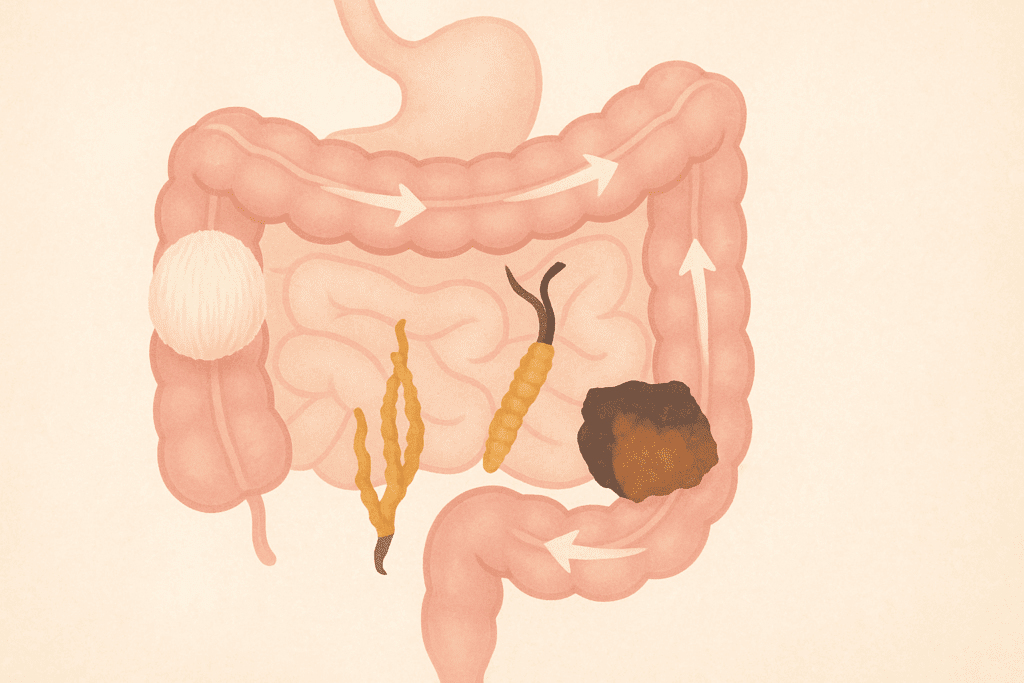
Exploring the Role of Mushroom Supplements in Alleviating Constipation
One of the lesser-discussed yet vital areas where mushroom supplements for gut health prove invaluable is in the management of constipation. Chronic constipation can significantly disrupt gut-brain communication, leading to symptoms like brain fog, irritability, and fatigue. Mushrooms contain bioactive components that promote peristalsis—the rhythmic contractions of the digestive tract—thereby supporting regular bowel movements and alleviating discomfort.
Among the most effective fungi in this context is lion’s mane, which not only supports neural growth but also enhances gut motility through its prebiotic properties. Prebiotics encourage the growth of beneficial bacteria such as Bifidobacterium and Akkermansia, which produce short-chain fatty acids like butyrate that stimulate smooth muscle function in the colon. This translates to more efficient waste elimination and a reduced likelihood of bloating and constipation.
Cordyceps, while often associated with stamina and energy, also exerts a subtle laxative effect by improving metabolic energy within intestinal cells. It enhances mitochondrial function and oxygen utilization, thereby supporting the energy-dependent processes involved in digestion and excretion. Users often report feeling lighter and more mentally alert once bowel regularity is restored through consistent supplementation.
The question “do mushrooms help with constipation?” has received increased attention from researchers. The consensus from emerging studies is promising: mushrooms, through their fiber content and microbial modulation, play a supportive role in easing bowel irregularities. This aligns with anecdotal reports that suggest mushrooms help you poop by normalizing stool consistency and frequency without harsh side effects. For those seeking a gentle and natural alternative to over-the-counter laxatives, mushrooms present a sustainable solution.
Additionally, the anti-inflammatory properties of reishi and chaga reduce intestinal irritation and improve absorption efficiency, which can prevent the buildup of waste material in the colon. By treating both the symptoms and underlying causes of sluggish digestion, mushroom supplements offer a comprehensive approach to gut and cognitive health.
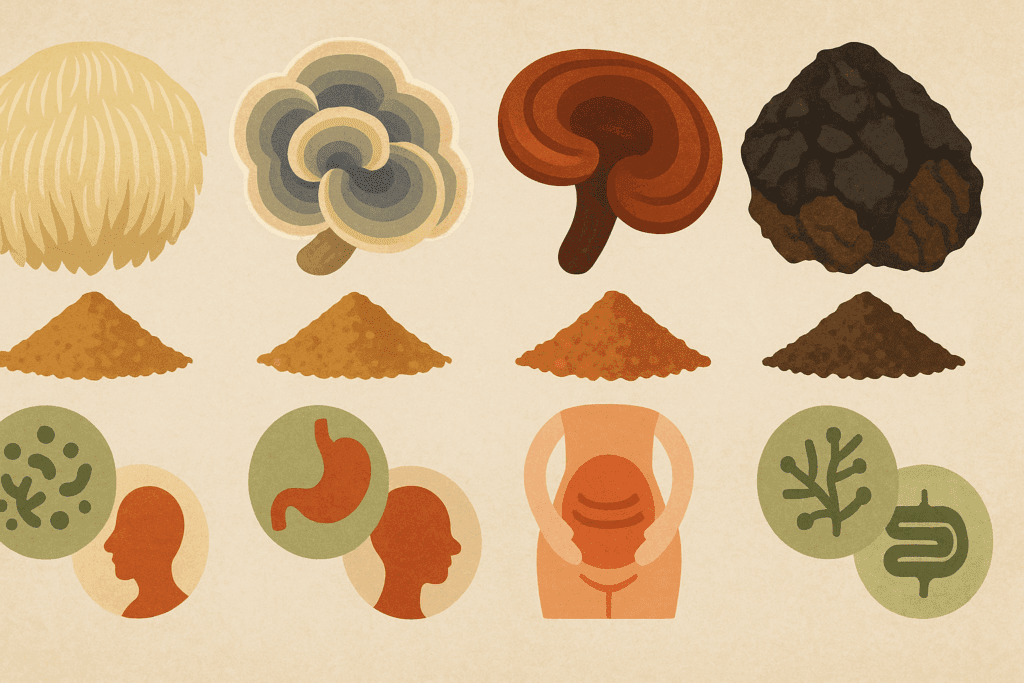
Best Mushroom Powder for Gut Health: Choosing the Right Formula
In a rapidly expanding market of functional foods and nutraceuticals, selecting the best mushroom powder for gut health requires a discerning eye. While many products claim broad benefits, only a few offer the full spectrum of therapeutic compounds necessary to deliver on their promises. Effective mushroom powders are typically dual-extracted, organic-certified, and lab-tested for purity and potency.
Lion’s mane and turkey tail consistently top the list of recommended options, not only for their robust clinical profiles but also for their digestibility and efficacy. Lion’s mane supports the regeneration of both enteric and central nervous system neurons, making it a unique gut-brain bridge. Turkey tail, with its wealth of beta-glucans and PSPs, stands out for bolstering the immune system and balancing gut flora.
When considering a product, the presence of chitinase-treated mushroom powders can be particularly advantageous. Chitinase enzymes break down chitin—the tough cell wall component of fungi—making the nutrients more bioavailable. This enzymatic enhancement maximizes the absorption of key compounds and ensures that the powder delivers both prebiotic and antioxidant effects efficiently.
Reishi mushroom powders should also be considered for those experiencing symptoms of gastrointestinal stress or immune dysregulation. Reishi’s triterpenes and polysaccharides offer targeted support for the gut lining, helping reduce permeability and associated inflammatory responses. Many users also find reishi to be calming, which further contributes to gut motility and relaxation of intestinal muscles.
The best mushroom powder for gut health is one that aligns with individual health goals and digestive patterns. By evaluating labels for transparency, ingredient integrity, and extraction methods, consumers can confidently select a product that delivers both cognitive and gastrointestinal benefits in one holistic package.
Do Mushroom Supplements Help with Gut Health and Cognitive Resilience?
To address the question “do mushrooms help gut health?” it’s essential to consider the cumulative effects observed in both scientific literature and user experience. Mushroom supplements not only support a healthier gut microbiome but also facilitate resilience to cognitive stressors. Their adaptogenic properties allow the body to modulate cortisol and adrenaline levels, hormones intricately linked to both mental clarity and digestive efficiency.
Mushrooms for gut health act at multiple levels: enhancing microbial diversity, fortifying the intestinal lining, and modulating inflammatory cytokines that affect the central nervous system. The cumulative result is a more resilient physiological and psychological state, where the mind can remain sharp and focused even under stress.
One of the more compelling mechanisms involves the modulation of serotonin production. As nearly 90% of serotonin is synthesized in the gut, improving gut health through mushroom supplementation can have a profound impact on emotional stability, mood regulation, and motivation. This reinforces the concept of the gut as the “second brain,” a paradigm increasingly recognized in neurology and integrative medicine.
Additionally, there is growing interest in the role of mushrooms for gut inflammation as it relates to neurodegenerative conditions. Chronic low-grade inflammation is a known contributor to cognitive decline, and by addressing this inflammation at its source—the gut—mushrooms help preserve brain plasticity and memory function. Reishi and chaga, in particular, have shown promise in reducing inflammatory biomarkers and improving executive functioning in early pilot studies.
Thus, the answer to “do mushrooms help with gut health?” extends far beyond digestion. They contribute to a system-wide enhancement of physiological balance, fostering a state of optimal mental and digestive synergy. Their multifunctional profile makes them an ideal cornerstone of any cognitive enhancement and gut wellness strategy.
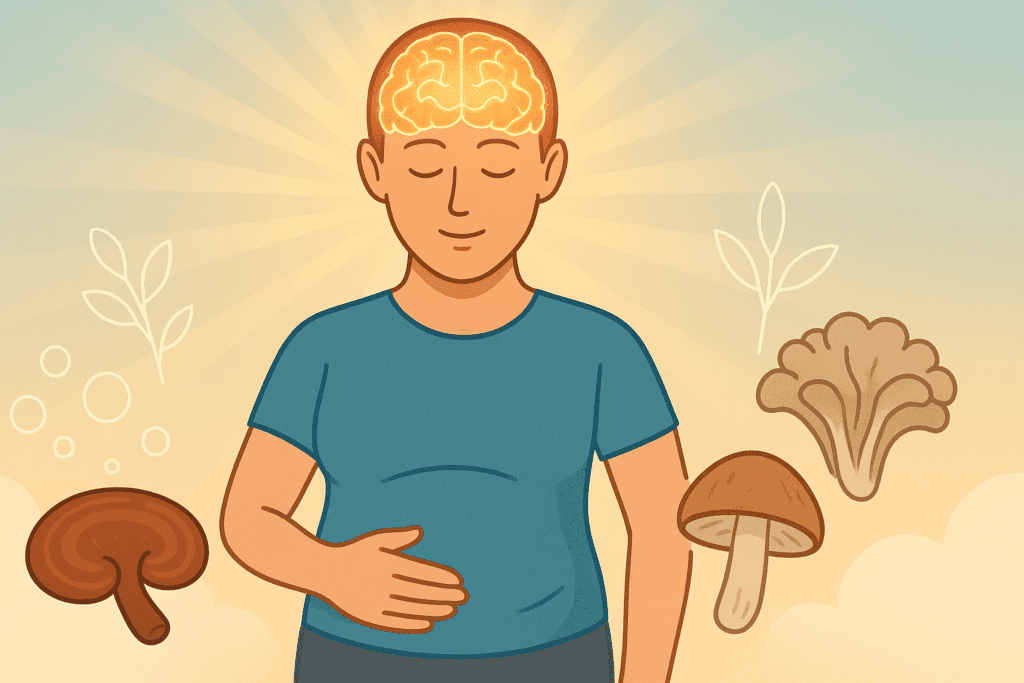
Do Mushrooms Help with Bloating and Why It Matters for Mental Clarity
Bloating is often dismissed as a minor digestive inconvenience, but its impact on cognitive performance can be surprisingly profound. When the digestive system is burdened with excess gas or sluggish transit, it can trigger systemic inflammation and discomfort that diverts energy and focus away from the brain. In this context, the question “do mushrooms help with bloating?” is more than just a query about gastrointestinal relief—it speaks directly to the pursuit of cognitive clarity and daily functionality.
Medicinal mushrooms such as turkey tail and lion’s mane have demonstrated particular efficacy in relieving bloating. Turkey tail’s prebiotic properties support the growth of beneficial gut bacteria, leading to reduced fermentation and gas production. Lion’s mane, meanwhile, soothes the enteric nervous system and optimizes motility, allowing for smoother digestion and less accumulation of intestinal gas.
One overlooked contributor to bloating is low-grade inflammation of the gut lining. Reishi and chaga help reduce this inflammation, resulting in less immune activation and improved absorption of nutrients. This directly translates to less water retention and a flatter, more comfortable abdomen. The reduced gut stress allows the nervous system to function without distraction, which enhances mental alertness and overall energy.
Mushrooms for bloating not only provide symptomatic relief but also address the underlying physiological conditions that lead to it. By improving gut motility, lowering inflammation, and nurturing microbial balance, these fungi help prevent bloating before it starts. In doing so, they also help maintain the integrity of the gut-brain connection, ensuring that physical discomfort doesn’t evolve into cognitive sluggishness or irritability.
Whether consumed as powders, capsules, or part of whole-food functional blends, mushroom supplements are a powerful ally in managing bloating and supporting holistic mental health. Their effects go beyond digestive comfort, contributing to the clear-headed vitality that defines peak performance.
Does Mushroom Supplementation Help You Poop? A Natural Answer to a Common Problem
For those grappling with irregular bowel habits, the search for gentle and effective remedies often leads to questions like “do mushrooms help you poop?” While the phrasing might sound colloquial, it reflects a genuine health concern with deep implications for gut-brain health. The answer, increasingly supported by research and anecdotal accounts alike, is affirmative.
Mushroom supplements, particularly those rich in prebiotic fibers and polysaccharides, help regulate bowel movements by enhancing the gut microbiome and stimulating peristalsis. Compounds such as beta-glucans from turkey tail and chitin from reishi serve as fermentable substrates for gut bacteria, promoting a healthy colonic environment that supports regular elimination.
In many cases, constipation results from dysbiosis—a disruption of the microbial ecosystem—and mushrooms work to correct this imbalance. Cordyceps adds an energy-boosting dimension, helping to stimulate the metabolic activity of intestinal cells, thereby improving motility. Reishi contributes to bowel regularity by calming the enteric nervous system, which is often overstimulated by stress and lifestyle factors.
What sets mushroom supplementation apart from synthetic laxatives is its holistic mode of action. Instead of forcibly triggering evacuation, mushrooms promote the body’s natural rhythm by addressing hydration, inflammation, and microbial health. This ensures a sustainable and side-effect-free approach to regularity that aligns with the body’s own needs.
For those experiencing intermittent or chronic constipation, the inclusion of mushroom powder for gut health can be a transformative step. Not only does it provide consistent support for digestion, but it also helps reduce the cognitive load associated with gastrointestinal discomfort. Improved elimination leads to better nutrient absorption, more stable energy levels, and enhanced mental focus—all integral aspects of wellbeing in the modern world.
Expert FAQ: Insights on Mushroom Supplements for Gut Health
1. What makes mushroom supplements for gut health more effective than other natural remedies?
Mushroom supplements for gut health offer a broader spectrum of bioactive compounds compared to most natural remedies. They include beta-glucans, polyphenols, and adaptogens that interact synergistically to support microbiota diversity and gut lining integrity. While traditional probiotics may seed the gut with specific strains, mushrooms create a prebiotic-rich environment that encourages long-term microbial resilience. Another distinguishing factor is their impact on stress modulation; adaptogenic mushrooms such as reishi and cordyceps influence cortisol levels, indirectly benefiting digestive motility and inflammation. This holistic approach helps mushrooms target not only symptoms like bloating or constipation but also underlying issues such as microbial imbalance and gut inflammation.
2. Are mushrooms a laxative, or do they support natural bowel function in a different way?
Although mushrooms are not classified as traditional laxatives, they do help regulate natural bowel movements through indirect mechanisms. The fiber content in mushrooms acts as a prebiotic, feeding beneficial bacteria that produce short-chain fatty acids like butyrate—important for colon health. Certain mushrooms like cordyceps improve mitochondrial energy in intestinal cells, which enhances peristalsis. This effect helps the body maintain its own rhythm without forcing elimination the way chemical laxatives do. As a result, individuals may experience more consistent, stress-free bowel movements when using mushrooms regularly.
3. What is the best mushroom for constipation relief, and how should it be used?
Lion’s mane is often considered the best mushroom for constipation due to its dual impact on the enteric nervous system and microbiota. It helps stimulate nerve function in the gut while providing prebiotic compounds that support microbial diversity. However, turkey tail and reishi are also highly effective, especially when inflammation and leaky gut contribute to constipation. Users typically experience the most benefit by taking mushroom powder for gut health consistently, preferably in the morning with warm water or in a smoothie. For more targeted relief, combining mushrooms with other gut-soothing herbs like ginger or peppermint may enhance results.
4. How do mushrooms for gut inflammation help cognitive performance?
Mushrooms for gut inflammation help reduce cytokine load—specifically IL-6 and TNF-alpha—that can cross the blood-brain barrier and affect brain function. Reishi and chaga are particularly effective in this domain because of their high triterpene and polyphenol content. These compounds modulate immune response and prevent systemic inflammation from reaching the brain. Improved gut lining health also leads to better absorption of amino acids like tryptophan, a serotonin precursor, which in turn supports mood and focus. Long-term use can help alleviate symptoms of brain fog, improve memory, and reduce mood swings associated with poor gut health.
5. Do mushrooms help you poop in cases of irregular digestion, and are there any risks?
Yes, many people find that mushrooms help you poop by encouraging gentle, natural elimination. Their prebiotic fibers promote fermentation in the colon, leading to stool softening and improved frequency. This is especially beneficial in cases of irregular digestion or mild IBS. However, because mushrooms also modulate immune responses, it is advisable for people with autoimmune disorders or on immunosuppressants to consult a healthcare provider before use. For most people, incorporating mushrooms gradually and monitoring for any discomfort is a safe and effective strategy.
6. Can mushroom supplements replace probiotics for gut health maintenance?
While mushroom supplements for gut health provide substantial support, they are not direct replacements for probiotics. Instead, they work synergistically by improving the gut environment in which probiotics thrive. The best mushroom powder for gut health often includes both prebiotic fibers and antioxidant compounds that help maintain microbial diversity over time. When combined with high-quality probiotics, mushrooms can amplify the benefits and create a more sustainable gut ecosystem. This approach is especially useful for those recovering from antibiotics or dealing with chronic digestive issues.
7. How do mushroom supplements compare with fiber supplements for bloating relief?
Mushrooms go beyond the mechanical bulking action of traditional fiber supplements by actively modulating inflammation and supporting gut-brain communication. The best mushroom supplement for bloating not only increases stool bulk but also enhances gut motility, reduces intestinal gas production, and lowers stress-related bloating through adaptogenic support. Reishi and turkey tail, for example, reduce histamine reactions and gut permeability, which are common causes of bloating. Unlike some fiber supplements that may cause initial discomfort, mushrooms tend to be more tolerable and beneficial over time. For sensitive individuals, mushroom powders offer a gentler path to digestive equilibrium.
8. Do mushrooms help with bloating caused by hormonal changes or stress?
Yes, mushrooms help with bloating that arises from hormonal fluctuations or stress by balancing adrenal response and gut microbiota. Adaptogenic mushrooms like reishi regulate cortisol levels, thereby minimizing stress-induced digestive disruption. Cordyceps supports cellular energy, improving digestion and reducing bloating tied to fatigue. Furthermore, the anti-inflammatory and immunomodulating effects of mushrooms stabilize gut barrier function, which is often compromised during periods of hormonal imbalance. Their ability to address both endocrine and digestive health makes them particularly valuable for individuals dealing with cyclical or stress-related bloating.
9. What is the best mushroom powder for gut health if someone has food sensitivities?
For individuals with food sensitivities, the best mushroom powder for gut health is typically one that is dual-extracted, certified organic, and free of fillers or allergens. Turkey tail and lion’s mane are well-tolerated by most and provide excellent support for gut barrier function and microbial diversity. These mushrooms help reduce gut permeability and support immune balance, which is essential for those experiencing reactions to food triggers. When choosing a product, it’s important to look for third-party testing and transparent sourcing. In sensitive cases, starting with a lower dose and gradually increasing can prevent any adverse responses.
10. Why are mushroom supplements for gut health becoming essential in modern wellness routines?
Mushroom supplements for gut health address a unique intersection of stress, inflammation, and cognitive overload that typifies modern lifestyles. They provide a multifunctional approach by supporting digestion, enhancing microbial balance, reducing inflammation, and promoting mental clarity. Unlike single-nutrient supplements, mushrooms adapt to the body’s needs and help restore homeostasis across multiple systems. With the rise of gut-brain axis research and functional medicine, these supplements are becoming a staple for those seeking long-term wellness rather than short-term fixes. Their growing popularity also reflects a cultural shift toward integrative, preventative health strategies that treat the root causes rather than symptoms.
Conclusion: Embracing the Holistic Power of Mushroom Supplements for Gut Health
As the body of scientific evidence continues to grow, it becomes increasingly clear that mushroom supplements for gut health are not just a passing trend but a cornerstone of future integrative wellness protocols. Their ability to nourish the microbiome, support intestinal integrity, reduce inflammation, and regulate neurotransmitter production positions them as a uniquely potent tool for enhancing both digestive and cognitive function.
Throughout this exploration, we’ve seen how specific varieties like lion’s mane, reishi, turkey tail, cordyceps, and chaga work individually and synergistically to support vital processes. Whether addressing common concerns like bloating and constipation, or tackling the more systemic issues of gut inflammation and cognitive fog, mushrooms offer gentle yet powerful solutions backed by both tradition and modern research.
Their impact on mood, memory, focus, and emotional regulation underscores the intricate relationship between the gut and the brain. In this light, mushrooms are not simply digestive aids—they are cognitive allies. By integrating them into a balanced diet and wellness routine, individuals can experience not just physical relief, but also mental clarity and emotional equilibrium.
For those navigating the complex landscape of natural health products, understanding the specific roles and benefits of various mushroom supplements is key. When used with intention and informed guidance, these ancient remedies provide modern solutions to some of today’s most pressing health challenges.
As more studies continue to highlight their vast therapeutic potential, one truth remains evident: mushroom supplements for gut health offer a transformative approach to achieving cognitive vitality and digestive harmony in tandem.
